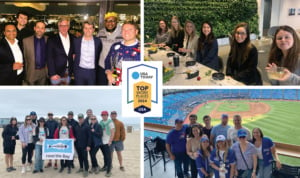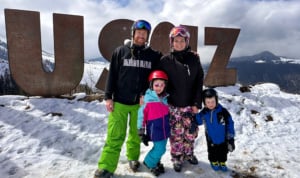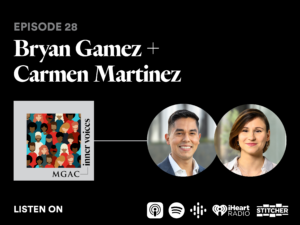MGAC Inner Voices: Episode 9

MGAC Inner Voices is an interview format podcast where a diverse mix of employees are interviewed to share their perspective on challenges they have faced in the A/E/C industry as a result of their identity—including race, ethnicity, religion, age, gender, sexuality, ability, etc. By discussing the experiences of our staff, our hope is that their stories will have newfound and powerful resonance with the audience—both to comfort others in similar situations and to encourage those in positions of power to bring about positive, actionable changes to workplace environments for all A/E/C professionals, regardless of their identity.
Bryan Gamez (MGAC Assistant Project Manager, Los Angeles) talks with Maxwell Williams (MGAC Assistant Project Manager, San Francisco) to discuss Max’s unique upbringing, his formative experience on a mini job site, and the importance of professional outreach to kids of all backgrounds.
View Transcript
Transcript
Bryan: Hi, everyone. And welcome to MGAC "Inner Voices," a podcast digging into the issues of diversity, equity and inclusion, and the architecture, engineering, and construction industry. As always, I'm gonna preface this podcast by letting you know that we are not experts in all things, diversity, equity, and inclusion. We wanna share our stories and discuss how together we can create better outcomes for all of us in the industry and beyond. As you all may know, I'm your podcast host, Bryan Gamez. I'm an Assistant Project Manager here at MGAC working and living in Los Angeles, California. And today, we have the great honor of speaking with Maxwell Williams, who is up in our San Francisco office. So, Max, do you wanna introduce yourself to our listeners?
Maxwell: Yeah, absolutely. Again, my name is Maxwell Williams. I'm Assistant Project Manager up here in San Francisco. I've been with MGAC seven months now.
Bryan: A fresh new face.
Maxwell: I have been in the construction project management industry for the past four years, spent three years out here in San Francisco, a year or two in Chicago doing program management for manufacturing company. And I am part of the African-American black group of people around the world.
Bryan: Actually, I just didn't know that you were from Chicago, Max. That's really cool. I love Chicago. Well, I'm happy that you're on today. I can't wait to talk about diversity and everything and your perspective on being a black American in the project management construction field. So we've already talked about what your background is. So, Max, we'll just jump into it. So, how has your identity as a black man affected you in the professional spaces? And have you faced any challenges in your career because of your identity?
Maxwell: Everybody definitely has their own set of challenges, and being a black man, I kind of have to preface with a saying that black fathers tell their black children, a black man has to work twice as hard in order to get half the recognition as certain peers. That stems from, you know, 400 years of slavery, 200 years of Jim Crow era up until now, a 100 years of new Jim Crow era. It reinforces that aspect because there are certain perspectives that I am looked at before anybody really knows who I am, where I come from, my comfortability in certain situations. And I really have seen that word of advice that my father has given me throughout my career, my educational journey because I've seen myself having to reach out a lot more, engage a lot more, challenge individuals when I've had a personal, very, very large contributing factor to certain accomplishments that the group has achieved. And it's not, you know, challenging like, oh, you didn't do this, but, hey, what about me?
Bryan: Everyone I've spoken to on this podcast and it does become personal at times. And what I've learned is that every person has these challenges and the general minority group, I feel like, should be really proud of themselves. Everyone in our company really should be proud of themselves because they've really contributed a lot to our industry. And you're saying now that, you know, the challenges we face is because of the societal norms that have been in place for centuries, right. That has created the issue. And right now we have...you're saying you have to work twice as hard, three times as hard just to get to where you wanna be.
Maxwell: Correct. From my perspective, I do believe that these challenges and what the effort of both of our forefathers' things have gotten a lot better for us. And a lot, 1,000 times easier for us compared to their situations. That being said, it was not that long ago and it is still around today so.
Bryan: And that's prevalent in the events that occurred in the past year.
Maxwell: Correct. I mean, the construction industry, architectural industry, contracting industry has a very traditional perspective in terms of how one should carry themselves, what needs to be focused on, how people move forward.
Bryan: And on that, Max, have you ever had to adapt who you are because of what that traditional sense of decorum should be because of what others before us, obviously in the industry have kind of have created, but that's a question I've asked other people, but it seems like here, it's quite relevant.
Maxwell: I've always been in a position of monetary privilege. That has helped really placed me in environments that reflect the corporate world, the industrial world, basically Western civilization.
Bryan: Do you mean like you're saying your socioeconomic status has helped?
Maxwell: Correct. So for, you know, people of color like me, black people coming from the South Side of Chicago, not many of us get to go to private school since we're, you know, the age of three. Not many of us even venture to the North Side of Chicago or Downtown Chicago or have that opportunity to even have friends or connections in different areas, in different neighborhoods, with different cultural influences.
Bryan: Did you grow up in the South Side of Chicago?
Maxwell: I did. Yeah, born and raised. I grew up South Side of Chicago. I was going to school on the North Side. So, you know, I had...
Bryan: You did that commute? That's a long commute, isn't it?
Maxwell: It's a decent commute. And my parents have been in the investment banking industry since the '80s, '90s. And being as intelligent as they are and successful as they are, they've had the capacity to send me to really good schools to get an incredible educational basis. That is not the same for people like me, where I come from whatsoever. That being said, neither is better than the other. I think one helps you maneuver and weave through social-economic structures within our society today.
Bryan: No, I absolutely agree. I think, you know, having the ability to go to a great school, you know, primary, secondary school starting young, that it almost structures how your life may end up, right? Minorities face absolutely more challenges, right? You don't have access to great schools. You need money to go to private school, right? So it's just, it's a systematic issue across the board. Yeah.
Maxwell: And at the same time, all the public schools in the areas are consistently defunded and funds allocated to other things that don't necessarily help improve the general standard of living in that particular zip code or area. As I'm sure you have experienced labels, microaggressions, jokes, baseline senses, and baseline philosophies, and perspective that others may have about your particular ethnic background. Those are challenges in and of itself because we know worlds that are so positive, vibrant, and hopeful where those types of things really diminished the humanity within our own challenges.
Bryan: And ourselves really. I mean, to the bottom line, it's us that it affects. Right? I agree with you. I mean those, yeah, "jokes, comments," you know, that treatment behavior is detrimental to, you know, us as an individual and also to a group. That actually kind of segues into my next question. You know, so with that, what is the greater big picture impact of this treatment and this behavior? Yeah. Beyond just what the jokes are and what these little comments are. I mean, we've already touched upon it.
Maxwell: Right. It is dehumanization. I only use that term because dehumanizing is dangerous and contagious simply due to the fact that we don't all want to be the same, but we all want to be treated the same.
Bryan: No, I know what you mean. Right. But that's interesting. You say dehumanization is contagious. I do think it can be and has been, right? And at the end of the day, we want equality for all, right? I hope that this podcast touches upon all these points and drives these points home to, you know, corporate America and leadership that as we move forward, this treatment and these items still exists. And I hope that in the future, they don't exist. Right. So treatment, if it continues, it'll take a mental toll on an individual and I know, in the pandemic, it's been tough on everyone because we haven't had that face-to-face interaction. So, you know, I think that as we move forward, we have to really use our platforms, our conversations with others to ensure that the treatment or just nasty behavior just doesn't persist. Right?
Maxwell: Absolutely. It just doesn't make sense if we are operating in the fashion that we're operating. There's really only one goal, and that is...well, several goals, three of which being prosperity, respect, and goal achievement. Maybe goal achievement ties into prosperity, but I separate the two because we're all working to a singular mode just as we need as social beings on this earth need to be aware of our carbon footprint that we're putting it on it and destroying the planet on which we live in to give our children and our grandchildren a future, a place to live the way that different perspective deal with each other has to be from a point of respect.
Bryan: Yeah, absolutely. A 100%, I agree with that point. I think that's been the baseline for almost all my conversations with everyone that there's a mutual respect that is sustained throughout, you know, all our careers throughout any of our interactions with other people and other humans. And I think that's what we're all working towards here.
Maxwell: I also want to take that a little further because, with respect, there needs to be the innate human capacity to understand different worlds. And not even understanding different worlds. It's just understanding that somebody has a different perspective from you. Somebody worships or celebrates religion in a different capacity to you. We have different celebrations for different reasons that may not make sense to the other person, but the other person really needs to sit back, listen, and respect wherever they came from instead of projecting their own sense of normality onto...
Bryan: Yeah. Onto that individual with opposing views. Yeah.
Maxwell: That, and processing what the other person is telling you. It's about internalizing how special diversity is, how special somebody from one part of the planet does something on another part of the planet.
Bryan: I 100% agree. You know, I kind of almost told that to my friends as well. You know we don't, I may not understand where someone else's lived experience. Right. But I can do my best to try and understand where they're coming from. To understand that their pain is real. Right? You know, I may not understand what the experience that caused that pain, but I can understand the pain that they're going through. You know, I don't want ever want to project my opinions onto others. Right? And as I speak with my friends, I'm thinking, you know, I respect all the decisions you make. I may not agree with them, but I'm not gonna project my opinions. I just would like to have a conversation with you, you know, to understand our opposing views. And maybe we can meet in the middle. Right.
You know, at the end of the day, humans all experience pain. And Oprah always...oh, I love Oprah. Back when she had her show, she always talked about how...or maybe it was Maya Angelou, but she talked about how all pain is the same, regardless of the experience. And it's our job as human beings to really understand where that individual is coming from. Because at the end of the day, it could happen to you and you're gonna be feeling that exact same pain. And it's our jobs to help each other really. And because when we help each other, that's gonna help everyone prosper. Right? And then, you know, that's in and of itself a little cliche, but I think of it to be true. And, you know, I'm optimistic person. And I hope that in 10 years' time, that's where we're at as a society. In 50 years' time, I hope that it's at a much better place than we're at now. If that makes sense.
Maxwell: Correct. Based on the way I've grown up, my experience, me to look back and see that people like me weren't allowed to drink at the same water fountains as another human being. Does that logically make sense to a knowledgeable individual? It just doesn't really make sense, especially if we're on this mission to thrive together as a species. Which I agree optimistically, I hope everybody's on the same, you know, page, same journey. Some people, you know, some people aren't. And I think that because of the fact that some people aren't, they've really taken things in for themselves and do whatever they can to shape the world around them, to their own perspective mode of operation.
Bryan: Yeah. I do have to say though, on that...I mean, while it's hard to fathom where we were in the 1960s, 1950s, I think that we have come a long way with desegregation. Well, don't get me wrong. A lot of segregated communities in the United States and around the world. I think that we have progressed from an era where it was so highly segregated, and now I hope that as we continue, you know, moving forward as society, that integration of everyone is welcomed and celebrated for everyone's unique diversity.
Maxwell: I completely agree. I feel as if we're kind of at the cusp and a real paradigm turning point, especially with our generation in terms of leading that charge.
Bryan: I would say Millennials and Gen Z are really, I think, driving that home. And you can see that. And especially as corporate America picks up on that, especially because it affects everything from like shopping habits, right? Where we wanna travel to? Where we wanna vacation to? Right. So I think that there...I think people are listening, as they're listening to this podcast, too.
Maxwell: I certainly hope so. I am.
Bryan: So we've basically touched about how diversity in and of itself is so important to our society. You know, you've already...you've touched upon it a little bit, but do you want to describe why it's so important in your opinion?
Maxwell: I mean, if you just look at the course of human history, can you really see why it took us along to get to this point where we are now in terms of trying to work together and be together? One, it just stems from an innate human nature of wanting to be comfortable in your own environment. And when you see that being threatened, we wanna recluse ourselves and do whatever it takes to protect what already is. From my perspective, it's important because as this world grows, as human beings evolve, as we're getting smarter as a species, as we touch different corners of our globe, as we're expanding our reach, we really understand how...we're really learning how similar we actually are. And if we set things up for everybody to be as comfortable as me and you are, amazing things can happen. And people can live life in peace and enjoy what's around them.
Bryan: I agree with that. And that's a common theme of this podcast. I wanna jump to our call to action in our industry. As project managers, you know, we help advise our clients and consult them when we're developing teams, and creating designs plans and, you know, the built environment, you know, what are ways that in the, in our industry, we can impact change through the work we do?
Maxwell: It's showing that work to somebody who may be curious about it. Anybody who may be curious about it? My parents, the house I spent majority of my life in, they build it from the ground up. So while they were off working, my grandfather would pick me up from school and take me to the property, to like, see how everything's going, check on contractors, check on progress, make sure everything's safe. And I really, I got to see how a house was built from the ground up. And it was an incredible experience. The superintendent foreman, Mr. Handy, he set me up with my own little workstation, taking the scrap pieces of wood that he was cutting, a couple of nails, and a hammer. Just don't hurt yourself. I'd be in like a little job site building like wood plains or the benches or something like that, even though it didn't hold up well, or have any structural integrity. There's no limitation...no one group of people are interested in doing one particular thing that we as human being to do, whether it is sports, music, entertainment, biology, chemistry, science, machinery, art, there's no specific group of people who want to do just that.
Bryan: Everyone around the world can be, you know, set their mind to being in any industry. Right. It's not for just one group of people.
Maxwell: Correct. So then as an organization, it's that organization's responsibility to seek out areas where the type of work we do, it may not be prominent in terms of, I guess, marketing or exposure to young formative mind. That being said, I believe that we have a responsibility to show those who don't know what we do, the possibilities. Maybe that's something that they would love to do and continue to do for the rest of their life.
Bryan: And I wanna, you know, pick your brain also, unlike for clients in our industry who are uncomfortable with diversity, what would you tell them? Or what measures can our colleagues take when clients seem uncomfortable with diversity.
Maxwell: I pretty much just ask why?
Bryan: Interesting.
Maxwell: What have their experiences been? You got to analyze the whole thing growing up. Where they've been, what they've been doing, who they've been interacting with.
Bryan: Keep an open mind.
Maxwell: Correct. What their monetary capacity has been in order to do the things that they do. Once you get down to the why and start asking logical questions of, okay, so that's your answer, but does that really make sense to you? Does that make sense to the person sitting next to you?
Bryan: But you're saying you're pushing back on what their norms are. And you're trying to have that conversation. You're opening it up for a conversation. That's what the why question is for. And that's an important question, frankly.
Maxwell: I mean, the reason that we do things really separates the trajectory of our existence. It shapes how well we do it, who we do things within the impact of our actions on other beings who are sharing this space of earth.
Bryan: You see, you talk about, you know, having that conversation with clients, but it's also one of our coworkers who just frankly, may have never experienced that. So if they haven't experienced discrimination or any negative treatment because of their identity, they may be a white man, never experienced that. What advice would you give them to be an ally?
Maxwell: Listen and do research. There is truth in everything. The amount of truth varies. Somebody tells you a blatant lie, you know, it is a blatant lie.
Bryan: Yeah I know it. I think I know what you mean
Maxwell: But In terms of perspective, there is truth. Truth is limited to a norm. Truth is the reality of one situation. And the reality of diverse ethnic group situation is that it hasn't been at the forefront of Western civilization ever, I guess, until now.
Bryan: But you're saying that anyone that does not understand our lived experiences is to...your main advice, piece of advice is to listen and to do their research. And that research could be as simple as having that conversation with the person sitting across the table from you, right. And listening to what their lived experiences are and that's the perspective you're asking them to see, and also respect, of the mutual respect.
Maxwell: Absolutely. Because you're not, I mean, nobody likes being treated poorly. Nobody likes being brushed off. So somebody continues to do that, you're just gonna be labeled a POS and not gonna be...not gonna wanna deal with that. You know, after the question, after I ask why, it's really a game of understanding motivation, whether or not they're really seeded in hatred and self-centeredness or a lack of complete understanding.
Bryan: Interesting, you know, I hope that with this conversation Max, I hope that people who are listening and, you know, gain a little bit of perspective and also motivation and an intention to reach out to others and listen to them, listen to their perspectives, listen to, as I said, their lived experiences and understand that individual at a personal level, not because of their background or their skin color, but because of what they can bring to the table. Right. You know, as we've talked about, this is our diversity and backgrounds should not be a limiting factor. They are assets to the team. So, I'm compelled to say that we've touched upon all those topics of how we can provide a narrative or really provide ways for others to appreciate where we're coming from. And also appreciate all our experiences.
Maxwell: Absolutely, like wholeheartedly.
Bryan: Max, I think that this has been a great conversation. I think we've touched upon a lot of topics here, and I hope that this resonates with people within the industry even far beyond just us and our industry as well. I think that it brings to mind the question of what is our motivation to bridge the gaps between inequity, right? So I really thank you for being a part of this today. It was a pleasure speaking with you, Max, and I think, I hope that all our listeners also gained a little bit of perspective today.
Maxwell: Bryan, thank you for having me. It was an absolute honor and pleasure to be here. I'm here because, you know, I just wanna be heard and I wanna share what I believe a solution can be on a personal level and on an individual level. And I wanna commend you and the team for really stepping up and making sure that this is a priority. Great.
Bryan: Thanks.
Maxwell: Of course.
Bryan: You know, I say that to you. Thank you. Well, with that, everyone, thank you for listening to this episode of MGAC "Inner Voices." I hope you check back next month for our next episode. Thanks, everyone. Bye.








